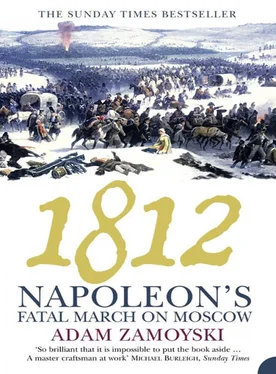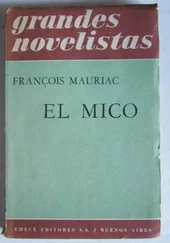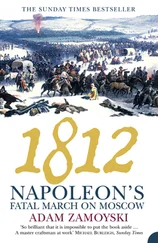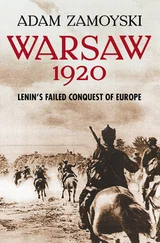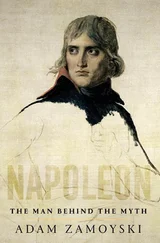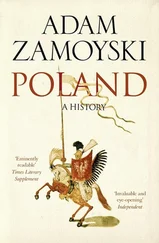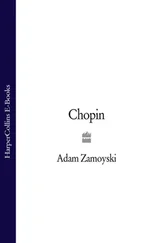France was in fact no longer exporting revolution. She had become little more than a vehicle for the ambitions of Bonaparte, who a couple of months later proclaimed himself Emperor of the French under the name of Napoleon I. What exactly these ambitions consisted of has perplexed and divided historians over two centuries, for Napoleon was never consistent in anything. His utterances can at best be taken to illustrate some of his thoughts and feelings, while his actions were often erratic and contradictory. He was intelligent and pragmatic, yet he allowed himself to indulge the most far-fetched fantasies; he was the ultimate opportunist, yet he could get caught up in his own dogma; he was a great cynic, yet he pursued romantic dreams. There was no grand idea or master project.
Napoleon was in large measure driven by nothing more complicated than the lust for power and domination over others. Attendant on this was an often childish set of reactions at being thwarted in any way. Having no sense of justice and no respect for the wishes of others, he took any objection to his actions as gratuitous rebellion, and responded with disproportionate vehemence. Instead of ignoring a minor setback or turning an obstacle, he would unleash bluster and force, which often involved him in unnecessarily costly head-on collisions.
He was also driven by a curious sense of destiny, a self-invented notion of a kind often affected by young men brought up on Romantic literature (his favourite reading had been the poems of Ossian and The Sorrows of Young Werther) , which he came to believe in himself. ‘Is there a man blind enough not to see,’ he had declared during his Egyptian campaign in 1798, ‘that destiny directs all my operations?’ 6Napoleon was also a great admirer of the plays of Corneille, and there is reason to believe he saw himself as acting out some great tragedy in their mould.
This sense of living out a destiny was to lead him repeatedly into acting against his better judgement in pursuit of nebulous dreams. His triumphs in Italy, followed by his spectacular victories at Austerlitz and Jena, only confirmed him in this fantasy, which communicated itself to his troops. ‘The intoxication of our joyful and proud exaltation was at its height,’ wrote one young officer after Napoleon’s triumph over Prussia. ‘One of our army corps proclaimed itself "the Tenth Legion of the New Caesar"!, another demanded that Napoleon should henceforth be known as "The Emperor of the West!"’ 7
But Napoleon was also the ruler of France. As such, he was inevitably driven by the same political, cultural and psychological motors which had dictated the policies of French rulers of the past such as François I and Louis XIV, who had striven for French hegemony over Europe in order to achieve lasting security.
France had always sought to impose a balance in central Europe that would prevent a major mobilisation of German forces against her, and she had achieved this by the Treaty of Westphalia back in 1648, in which she and Austria, jointly with a number of other powers, had put in place a whole series of checks and balances. This system had been undone in the second half of the eighteenth century by the rise of Prussian power and the emergence of Russia as a player in European affairs, manifested most critically in huge shifts of power in Germany, the partition and disappearance of Poland, and the race for control of the Balkans. In view of this, it was quite natural that Napoleon should seek to reassert French interests, and in doing so he was pursuing a traditional vision of a ‘French’ Europe as much as his own personal ambition. It was a vision that appeared to have history on its side.
In the eighteenth century France had become the cynosure of Europe in terms of culture and political thought. Her paramountcy in these spheres was consolidated by the revolution, whose fundamental message and ideas were admired and accepted by élites all over the Continent. The French political and military classes saw themselves as ‘ la Grande Nation ’, the first nation in Europe to have emancipated itself, and considered themselves to be armed with a mission to carry the benefits of what they had achieved to other peoples. This was the age of neo-Classicism, and they began to see France as the next Rome, the fount from which this new ideological civilisation radiated, the capital of the modern world.
Napoleon was not immune to the enthusiasms of his age. As befitted the most powerful individual since the days of the Caesars, he issued decrees ordering the cleaning of the Tiber and the Forum Romanum, and the preservation of its monuments. Shortly after the birth of the King of Rome, he set in motion plans for an imperial palace on the Capitol. But he also intended to build one for the Pope in Paris, arguing that this was where he should move, just as St Peter had moved to Rome from the Holy Land. 8
As early as the mid-1790s, the French revolutionary armies began to bring home to Paris not only valuables and works of art, but also libraries, scientific instruments and entire archives. This epic bout of looting was not the product of mere greed. The idea was that everything most useful to the development of civilisation should be concentrated at the heart of the Empire, and not allowed to benefit only a few in outlying provinces. ‘The French Empire shall become the metropolis of all other sovereignties,’ Napoleon once said to a friend. ‘I want to force every king in Europe to build a large palace for his use in Paris. When an Emperor of the French is crowned, these kings shall come to Paris, and they shall adorn that imposing ceremony with their presence and salute it with their homage.’ It was not so much a question of France ‘ über alles ’. ‘European society needs a regeneration,’ Napoleon asserted in conversation in 1805. ‘There must be a superior power which dominates all the other powers, with enough authority to force them to live in harmony with one another – and France is the best placed for that purpose.’ He was, like many a tyrant, utopian in his ambitions. ‘We must have a European legal system, a European appeal court, a common currency, the same weights and measures, the same laws,’ Napoleon once said to Joseph Fouché. ‘I must make of all the peoples of Europe one people, and of Paris the capital of the world.’ 9
France’s claim to the mantle of Imperial Rome seemed to gain validation when, in 1810, Napoleon married Marie-Louise, daughter of the last Holy Roman Emperor Francis II. His father-in-law, now Emperor of Austria under the name of Francis I, appeared to acquiesce in this transference of power. When Napoleon produced an heir, Francis ceded to the child the title of King of Rome, which had traditionally been that of the son of the Holy Roman Emperor.
France’s position on the Continent was by then one of unprecedented power; her political culture and the new system were imposed over vast areas of Europe. But to the average Frenchman this was of less interest than the benefits the past decade had brought him at home. All the most positive gains of the revolution had been salvaged, but order, prosperity and stability had been guaranteed, and a general amnesia if not amnesty had allowed those divided by the struggles of the revolution to put the more unpleasant aspects of the past behind them. Whether this new order would survive depended not only on Napoleon’s ability to defend it, but on his ability to guarantee its continuance by cancelling out the possibility of a Bourbon restoration. A return of the Bourbons would mean not only a return to the ancien régime ; it would also raise the prospect of much score-settling.
In this respect, the birth of the King of Rome was crucial. Most of Napoleon’s subjects believed that their ruler, who had recently turned forty, would henceforth be inclined to spend more time with his family than with his armies, that Napoleon the Great would in time be succeeded by Napoleon II, and that the rest of Europe would accept that the Bourbons had been consigned to history. That was why they rejoiced. ‘People sincerely anticipated a period of profound peace; the idea of war and occupations of that sort were no longer entertained as being realistic,’ wrote Napoleon’s chief of police, General Savary, adding that the child appeared to all as the guarantor of political stability. 10
Читать дальше
